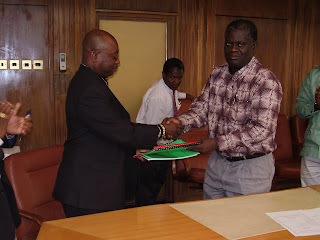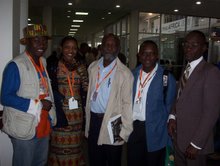KNUST and AGI signs MOU to promote technical cooperation
Pix. Vice Chancellor of the KNUST, Professor K. K. Adarkwa (right) and the President of the AGI, Mr Tony Oteng Gyasi (left), appended their signatures to the MOU at the university in Kumasi today (Friday).
The Association of Ghana Industries (AGI) and the Kwame Nkrumah University of Science and Technology have signed a Memorandum of Understanding (MOU) to build capacity and develop technical cooperation.
The move is to help foster a relationship that would see to the training of graduates at the KNUST for requisite industrial needs.
Under the agreement, the AGI is to create a forum that would enable its membership to make an input into the KNUST’s curriculum development process as a way of enhancing mutual benefit.
The AGI is also to facilitate the identification of and financial support for continuing engineering education needs of its membership that can be provided by the KNUST.
The Vice Chancellor of the KNUST, Professor K. K. Adarkwa and the President of the AGI, Mr Tony Oteng Gyasi, appended their signatures to the MOU at the university in Kumasi today (Friday).
The agreement came at the time members of the public had on numerous occasions raised concerns as to why the universities were not collaborating effectively with industry for their mutual benefit.
There has also been instances where engineering students had graduated from the KNUST without getting the opportunity to have an industrial experience.
This, according to Mr Oteng Gyasi was an anomaly, which needed to be rectified hence he said the AGI would facilitate educational visits of KNUST staff and students to AGI member establishments.
With the signing of the MOU, the KNUST as a technology university would be better placed to train graduates to solve engineering problems of AGI members either on the basis of consultancy or sponsored research as well as from time to time bring to attention of AGI members the resources and capabilities of the university.
The AGI is also to promote and facilitate short-term attachment of KNUST teaching staff to AGI member establishments for the purpose of helping to keep abreast with developments in Ghanaian industry.
Under the agreement the AGI would also encourage its members to identify consultancy assignments for KNUST staff and to sponsor research work at the KNUST and also facilitate the identification of engineering problems of AGI members and bring these problems to the attention of the KNUST..
The AGI President said the intent of the agreement was to provide a mechanism for KNUST and AGI to cooperate in mutually progressive and supportive activities, which would not compromise either party or their relationship with other parties.
The MOU is to continue for a period of five years and may be renewed by mutual consent by both institutions.
Mr Oteng Gyasi said the industrial sector felt that its major collaborator had to be the KNUST since already a lot of products from the university were working in the sector.
He said it was a shame that some students graduated with a degree in engineering without having experience in an industrial environment.
He said although it was true that the numbers of the students were growing larger and all could not fit into industries for attachment, the focus should not only be on big companies like VALCO. Rather the Small and Medium Enterprises (SME) should also be considered since that sector even offered more challengers for students to be able to impart the little they learnt in school.
The AGI President said apart from students’ industrial attachment, they ought to focus on how to address industrial problems with the collaboration of the KNUST.
He said most of the time when problems arose in industries, the speed with which responses came locally were not encouraging, thus most industrialists tend to look abroad for assistance.
The Vice Chancellor of the KNUST, Prof Adarkwa, said with the signing of the MOU, the university would now focus attention on tackling industrial problems.









































No comments:
Post a Comment